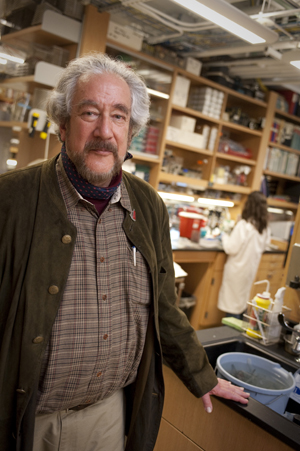BUSM's Goldstein Wins Hartwell Award for Genetics Research
For decades, Richard Goldstein has been trying to unlock a genetic puzzle that holds the secret to a more effective vaccine for a pneumonia strain that kills more than a million children a year worldwide. For his work, the BU School of Medicine professor of pediatrics was recently awarded a three-year, $300,000 grant from the Hartwell Foundation, which funds biomedical applied research with the potential to benefit children.

Goldstein says he draws ongoing inspiration from a long-deceased but towering figure in science: Charles Darwin.
“Everything I say comes from Darwin’s notes of 1859,” he says, crediting the architect of the theory of evolution with the groundwork for a novel, if especially painstaking, study of mutations in pneumonia-causing bacteria. “It’s an inventive, cutting-edge approach,” says Goldstein, who has amassed the world’s largest collection of streptococcus pneumonia, a bacterium that lives in the nasal passages. The microbe is the most common cause of bacterial meningitis, one of the top two bacterial culprits in ear infections. “The healthy high school football star who dies from meningitis — that’s streptococcus pneumonia,” he says.
Without Prevnar, the existing vaccine for streptococcus pneumonia, the global death toll would be far higher. But that vaccine, developed in the late 1990s, prevents infection in only about 8 percent of the known variants of the bacteria’s coating, says Goldstein. Like many vaccines for viruses as well as bacteria, Prevnar works by inducing antibodies in the immune system that are specific to a target. By taking a broader, genetics-based approach, he hopes to create a vaccine that will trigger antibodies for all strains of the streptococcus pneumonia bacteria.
This is where Goldstein gets help from his old friend Darwin. If he can isolate the bacteria’s evolutionary stable genes — those that do not mutate — he can use recombinant genetics, a molecular biologist’s tool, to trick the body into specifically defending itself against unvarying targets. It’s an out-of-the-box approach, involving testing thousands of samples of streptococcus bacteria, which Goldstein has wheedled out of labs around the world. He has already studied genetic sequences in 1,000 of the strains.
“I’m a molecular geneticist,” he says. “I think genetics.” Through his research he will be able to identify a previously untapped reservoir of genes that code for the proteins on the bacteria’s surface and function as antibody targets.
Although Goldstein’s work is immediately focused on streptococcus pneumonia, he says the implications of this novel strategy could apply to all bacterial pathogens.
In its review of Goldstein’s research, the Hartwell Foundation lauded his work as a “promising alternative that would provide universal protection against all known pneumococcal strains.”
This is the third year in a row that the Hartwell Foundation has awarded grants to BU researchers. In 2009 a $300,000, three-year grant was awarded to Joyce Wong, a College of Engineering professor of biomedical engineering, for her work creating engineered blood vessels to correct heart defects in children. The previous year a Hartwell grant went to Michael Wolfe, a School of Medicine professor of gastroenterology and medicine and a research professor of physiology and biophysics, for developing a technique to replace deficient hormones in diseases like type 1 diabetes.
This BU Today story was written by Susan Seligson. She can be reached at sueselig@bu.edu.